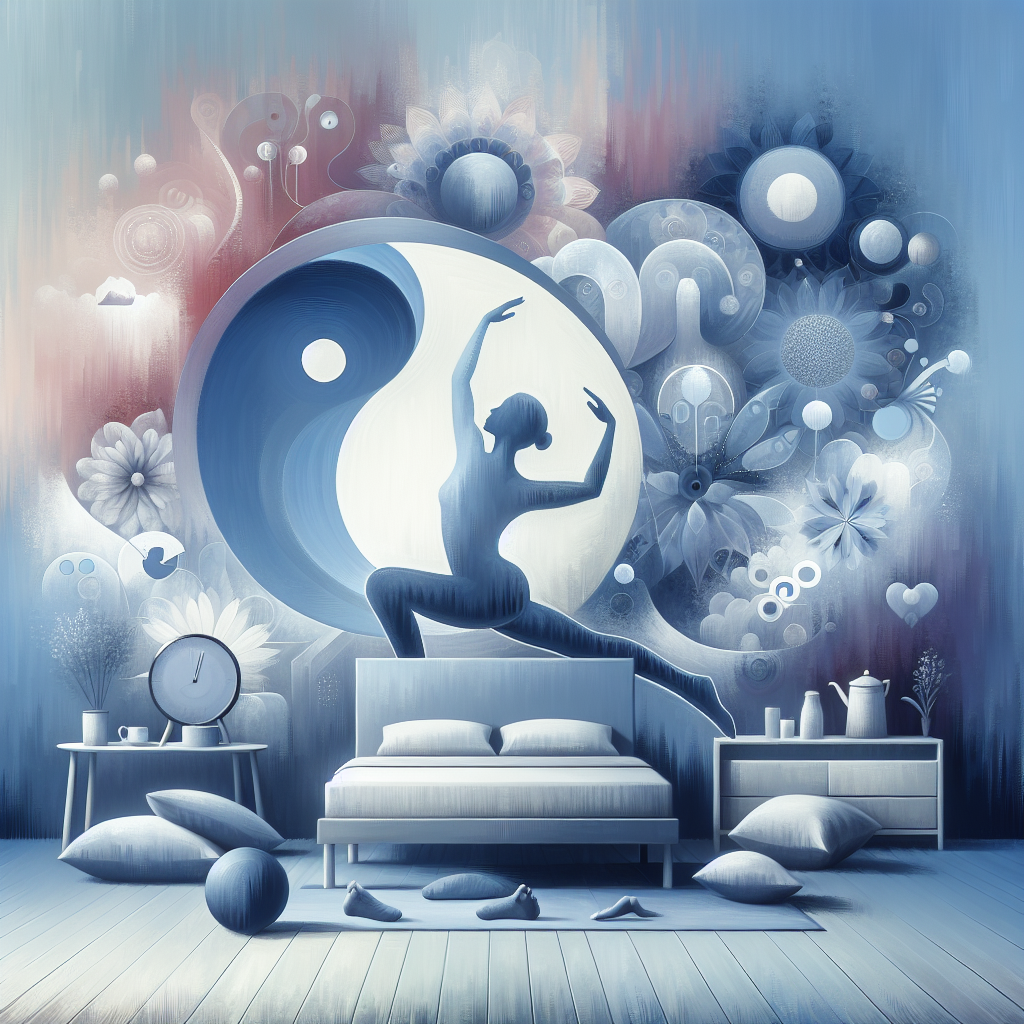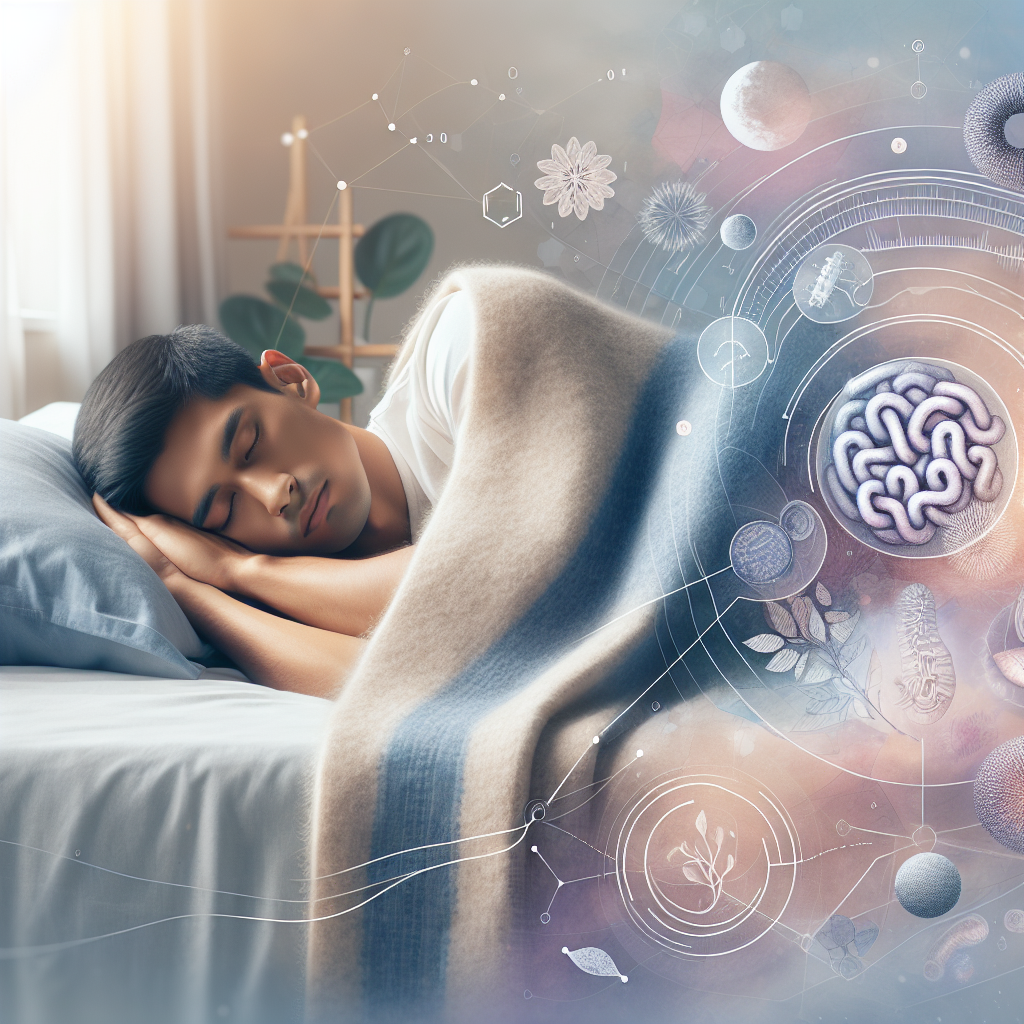Sleep Articles & Insights
Discover gentle wisdom, natural solutions, and cozy strategies for peaceful nights and restful sleep.
Waking up between 3–5 AM isn’t random. Learn what’s happening in your body, why it keeps pulling you awake, and how to fall back asleep gently.
Learn how elevated evening cortisol keeps you awake, the science behind cortisol curves, and 9 natural methods to lower nighttime stress hormones — including TCM insights, aromatherapy, acupressure points, and SleepCureAI tools.
In the tranquil sanctuary of night, as you lay in bed seeking rest, the echoes of your past may subtly influence your ability to drift into peaceful slumber. Attachment styles, deeply rooted in early experiences with caregivers, shape not only our relationships but also how we sleep. If you've ever wondered why restful nights elude you, understanding your attachment style could unravel part of the mystery.
We've all been there: you wake suddenly at 3AM, your mind swirling with worries about tomorrow’s meetings, forgotten tasks, or existential thoughts. Nighttime overthinking, especially during the wee hours, can feel like a relentless cycle that prevents restful sleep. With my own experiences battling this anxiety loop, I understand the desperation that comes with yearning for a night of uninterrupted peace. Fortunately, there are practical steps and mindful practices that can gently guide your mind back to serenity.
There's something hauntingly familiar about waking up in the stillness of 2AM—those disquieting early hours when the world is shrouded in silence, yet your mind is abuzz. If you're among those who find themselves battling wakefulness at this uncanny hour, you're not alone. Understanding the mysteries behind these nocturnal interruptions can illuminate the path to reclaiming your nights.
In the hushed whispers of night, when silence amplifies our thoughts, finding tranquility can often seem like a distant dream. Journaling before bed could be the gentle guide you need to navigate through the chaos of the mind, offering clarity, reducing anxiety, and paving the way to restorative sleep.
In the quiet darkness of night, when the world fades and rest beckons, some find it elusive to drift off into serene slumber. As someone who has navigated the turbulent seas of insomnia, I turned to the comforting ritual of warm baths. The warmth enveloping my weary body, the subtle drop in core temperature afterward—these became my trusted guides to restful sleep. Could this simple, ancient practice hold the secrets to conquering sleep struggles? Let's dive into the science behind how warm baths can pave the way to better nights, enriched with the magical touch of lavender or Epsom salts.
When the clock hits 4AM and your eyes snap open, it can feel like a personal battle against sleep. If you find yourself consistently waking at this hour, you're not alone. From stress to blood sugar fluctuations, a myriad of factors might be at play. Understanding these causes and employing effective strategies can help you reclaim restful nights.
In a world bathed constantly in the glow of screens, finding true rest has become an elusive treasure for many. When insomnia tightened its grip on my life, I discovered the serenity of embracing a no-tech bedtime ritual—a journey that redefined my nights and restored my days. If sleeplessness has left you yearning for solace, joining me to explore these discoveries may guide you toward the slumber you desire.
In the chaos of daily life, uncovering a peaceful slumber can feel like an elusive dream. Crafting an evening routine that soothes both body and mind can be transformative. In this article, you’ll discover the power of rituals that prepare your body for rest, learn what to avoid before bedtime, and find practical examples to help you wind down effectively. By weaving consistency into your nighttime habits, restful sleep is within reach.
When restless nights became my norm during a particularly overwhelming phase of life, I stumbled onto the serene world of breathwork. What began as a desperate attempt to quell my racing thoughts evolved into a powerful nightly ritual that transformed my approach to sleep. Within this article, we'll explore how different breathwork techniques can bring calm to your nervous system, ease you into restful slumber, and become a staple in your sleep toolkit.
In the realm of sleep solutions, red light therapy has emerged as a beacon of hope for those seeking better slumber. When insomnia took hold during my relentless work schedule, I turned to this innovative approach in desperation. Little did I know, the warm glow of red light would become my nightly ally, guiding me toward more restorative rest. In this article, we explore how red light therapy affects melatonin, empower mitochondria, and integrate into healthy sleep habits.
When I struggled with insomnia during my burnout period, I was surprised to learn that the answer might lie not just in my mind, but in my gut. The intricate link between gut health and sleep opened my eyes to how our body's internal systems are masterfully interconnected, influencing everything from daytime alertness to the quality of sleep. Understanding this connection has been pivotal in my journey to better rest and overall well-being.
When I struggled with insomnia during my burnout period, I was willing to try anything to reclaim the restful nights I once knew. That's when I stumbled upon intermittent fasting, not just as a dietary regimen but as a tool to realign my body’s natural rhythms. The surprising link between when we eat and how we sleep opened my eyes to a world where fasting could guide me back to slumber. Understanding this connection is the first step to harnessing fasting for better rest.
Sleep is often overlooked in its profound impact on our body's hormonal equilibrium. Hormones regulate a myriad of bodily functions, and the interplay between sleep and hormones like cortisol, melatonin, and insulin is complex yet crucial. Understanding this relationship can be a gateway to better health and well-being.
When I struggled with insomnia during a particularly stressful period in my life, the quiet hours of the night became a battlefield of restlessness. Desperate for relief, I turned to natural sleep supplements. Little did I know, this journey would teach me the profound value of understanding and choosing the right supplements not just for sleep onset but for deep, restorative slumber.
Sleep can be an elusive sanctuary, especially when anxiety and stress seem to waggle their fingers relentlessly at bedtime. Like so many, I found myself at a crossroads where the search for more tranquil evenings brought me to the doorsteps of natural remedies: magnesium and ashwagandha. Backed by evidence and grounded in the whispers of my lived experience, these two naturals could be precisely what you need.
Every Monday morning, as I groggily reach for my third cup of coffee, I can't help but wonder if my weekend sleep-in sessions are doing me more harm than good. In the modern era, where our schedules often leave us with sleep debt by week's end, many of us treat the weekend as a time for catching up on lost sleep. But is this the right approach, or could it be contributing to a perpetual cycle of fatigue?
Picture this: you wake up in the morning feeling genuinely refreshed and ready to seize the day. For many, this sensation remains elusive, overshadowed by grogginess and frequent yawns. One size does not fit all when it comes to sleep, but how do you determine your ideal amount? Uncovering this secret could revolutionize not just your mornings but your entire life.
When I struggled with insomnia during my burnout period, the impact on my physical performance was glaring. My endurance diminished, my strength plateaued, and I was constantly sore. This experience led me to explore the profound relationship between sleep and muscle recovery, a journey that unveiled the science behind how our bodies mend and build muscles during sleep, the pivotal role of growth hormones, and the stark effects of sleep deprivation on athletic performance.
Despite advances in technology and sleep science, many people in 2025 find themselves still waking up tired. This persistent fatigue can be frustrating and detrimental to daily life. Fortunately, understanding the root causes of morning fatigue and implementing effective solutions can help you achieve the restful sleep you deserve.
Living with chronic pain can significantly affect the quality of your sleep. Pain can disrupt your rest, making it difficult to get the restorative sleep your body needs to heal and function. However, with the right approaches and strategies, you can improve your chances of a good night's sleep even when dealing with chronic pain.
In a world where our days are packed with demands, the concept of 'Revenge Bedtime Procrastination' has emerged as a curious self-sabotaging behavior. It reflects the struggle of carving out personal time in a hectic schedule, often at the expense of much-needed rest. Understanding the roots of this phenomenon and its impact on sleep can pave the way to healthier sleep habits and improved overall well-being.
Parasomnias, which include sleepwalking and night terrors, are disruptive sleep disorders that can impact the well-being of sufferers and their families. Understanding these conditions is crucial for ensuring safety and seeking appropriate treatment. This article delves into the nature of parasomnias, the differences between night terrors and nightmares, who might be at risk, and when it's essential to consult a sleep clinic.
In our fast-paced world, the transition from the day's hustle and bustle to the calmness of nighttime can be challenging. Many individuals find themselves plagued by sleep anxiety, where the mind races with thoughts and worries instead of peacefully drifting into slumber. Understanding how to calm your mind before bed is crucial for achieving restorative sleep and enhancing overall well-being.
Do you often find yourself struggling to fall asleep at night, only to feel exhausted in the morning? If you’re experiencing inconsistent sleep-wake patterns, you may be dealing with a circadian rhythm disorder. Understanding these disorders, their causes, and treatments can be pivotal to improving your sleep quality and overall wellness.
Teeth grinding, or bruxism, is a common condition that can cause significant damage to your dental health and disrupt your sleep. Recognizing the causes, symptoms, and effective ways to manage and prevent bruxism can make all the difference in protecting your overall well-being.
Restless Legs Syndrome (RLS) is a neurological disorder that creates an irresistible urge to move the legs, especially in rest situations. This condition, affecting millions worldwide, poses significant challenges to restful sleep and overall quality of life by interrupting the natural sleep cycle and causing discomfort and frustration. Understanding its root causes, impact, and management strategies can not only offer relief but also improve sleep health and well-being.
In our fast-paced world, harnessing the efficiency of sleep can lead to enhanced cognitive function and overall well-being. Power naps, often overlooked in favor of caffeine bursts, promise not only a moment of rest but potentially increased alertness, improved learning capabilities, and a bump in productivity. Delve into how power naps could be your secret weapon for a sharper, smarter you.
Discover how quality sleep enhances idea generation, problem-solving, and innovation. Learn why great minds rely on rest to unlock creative potential.
Sleep Apnea is a prevalent yet often underdiagnosed sleep disorder that significantly impacts the quality of life. Understanding its types, symptoms, and treatments is crucial for improving sleep health and overall well-being. This article explores the intricacies of sleep apnea, from its causes to its potential health consequences and effective management strategies.
Night sweats can be an unsettling and uncomfortable experience, disrupting the quality of your sleep and leaving you feeling drained. Though often dismissed as a benign occurrence, understanding the underlying causes can be pivotal in addressing and managing this condition. From hormonal imbalances to stress, night sweats can be triggered by a variety of factors. In this article, we delve into the potential causes of night sweats, practical solutions, and when it might be time to consult a healthcare professional.
Chronic insomnia is a common and unwelcome visitor in many people's lives, manifesting as difficulty falling asleep, staying asleep, or experiencing refreshment from sleep. While medication is often prescribed to tackle this issue, many individuals seek alternative routes to achieve restful nights naturally. In this article, we'll explore various techniques and strategies to combat insomnia without medication, focusing on the underlying causes, psychological interventions, and lifestyle adjustments that can pave the way to consistent, rejuvenating sleep.
Sleep deprivation is more than just a personal health issue; it can ripple out to affect every relationship in our lives, especially those closest to our hearts. Understanding how poor sleep can lead to irritability, emotional misregulation, and reduce empathy, allows couples to address these challenges proactively and nurture a healthier, more connected partnership.
Finding the right time to wake up is crucial for maintaining optimal energy and mood throughout the day. Thanks to scientific insights into our body's natural rhythms, cortisol patterns, and even sunlight exposure, determining this ideal time has become a more precise art. Let's explore how understanding these factors, along with personal chronotypes, can transform your mornings from groggy to invigorating.
Sleep is often undervalued in our fast-paced world, despite its crucial role in maintaining a robust immune system. Understanding the dynamic relationship between sleep and immunity can empower you to make healthier lifestyle choices that bolster your body's defense mechanisms. In this article, we explore how sleep—or the lack thereof—impacts immune cell activity, contributes to chronic inflammation, and influences your risk of illness. Moreover, we delve into the benefits of deep sleep, the role of naps, and effective strategies to enhance immune function through better sleep quality.
Sleep is a vital component of overall health, particularly for teenagers who undergo rapid physical, mental, and emotional development. Despite their need for more rest than adults, many teens struggle to get adequate sleep due to a variety of factors ranging from biological to social influences. Understanding the unique challenges teens face can help parents, educators, and teens themselves foster healthier sleep habits.
Shift work, a necessity in our 24/7 society, plays a vital role in healthcare, public safety, and numerous other sectors. However, the irregular hours can significantly disrupt natural sleep-wake cycles, leading to potential health risks and sleep disorders. Understanding how shift work impacts sleep quality and learning strategies to mitigate these effects is crucial for maintaining overall health and well-being.
Determining the best time to go to bed can greatly influence your overall health, mood, and productivity. Understanding the factors that contribute to choosing the right bedtime, such as circadian rhythms and personal lifestyle, is key to establishing a routine that promotes restful sleep and optimal well-being.
In the pursuit of maintaining a healthy weight, sleep often gets overlooked. Yet, there is a critical connection between sleep and weight gain. Hormonal balance, metabolism, and even our eating habits are heavily influenced by how much shuteye we get. Understanding this relationship is vital for anyone looking to manage weight effectively.
Sleep is a fundamental component of overall health, but its effects transcend the physical domain, profoundly impacting our mood and mental health. Understanding how sleep influences emotional regulation, and contributes to conditions such as anxiety and depression, can empower us to adopt practices that enhance both our sleep and mental wellbeing.
In today's fast-paced world, the importance of a good night's sleep is often overlooked, yet it plays a crucial role in our daily productivity and decision-making abilities. Understanding the profound impact of sleep on our mental and physical functions can drive us to prioritize our rest, ultimately leading to a more successful and balanced life.
Menopause can be a challenging time for many women, bringing about a myriad of physiological and emotional changes. One of the most common and disruptive issues during menopause is sleep disturbance. As hormone levels fluctuate, achieving a restful night's sleep can become elusive. However, with the right strategies, it is possible to improve sleep quality and manage menopausal symptoms more effectively.
In today's fast-paced world, sleep often falls to the wayside as we juggle work, family, and social obligations. It's common to hear someone comment about 'catching up on sleep' over a weekend or through an extra-long lie-in on a day off. But is it possible to compensate for those sleepless nights? This article delves into the intriguing science behind sleep deprivation and recovery, offering insights and advice on how to better manage our sleep health.
Sleep is a complex and intricate phenomenon that encompasses various memorable and perplexing experiences, such as sleep paralysis and lucid dreaming. While these experiences can be unsettling or exhilarating, understanding their nature and underlying mechanisms can demystify them and contribute to improved sleep health.
In the quest for ultimate productivity and optimization, some people have turned to a sleep pattern that drastically alters the traditional understanding of rest—polyphasic sleep. While proponents hail it as a revolutionary biohack, skeptics warn of the potential risks and downsides. This article explores the concept of polyphasic sleep and examines whether it is a viable alternative to our conventional sleep patterns.
As the world quiets down and night envelops us, for many, this is when their minds begin to race uncontrollably. The quiet hours before sleep can be filled with an onslaught of thoughts, ranging from the day's worries to the broader anxieties about life. This phenomenon, commonly known as a restless mind, not only robs us of our peace but also our much-needed rest. Fortunately, there are effective strategies to calm these racing thoughts, making it possible to enjoy a serene and restful night's sleep.
Waking up in the middle of the night can be a perplexing and frustrating experience, especially if it's consistently at 3AM. Understanding why this happens and how to address it can significantly improve your sleep quality and overall well-being. This article explores the common reasons behind this phenomenon and provides actionable strategies to help you reclaim your nights.
Discover how Cognitive Behavioral Therapy for Insomnia (CBT-I) can help you fall asleep faster, stay asleep longer, and finally ditch the sleep meds—for good.
As we continue to navigate the complex world of sleep science, 2025 brings a fresh set of strategies to help us achieve restful and rejuvenating sleep. Whether you're struggling with insomnia or just looking to optimize your nightly routine, these scientifically-backed sleep hacks can make a significant difference in your quality of sleep.
In today's fast-paced world, the significance of quality sleep is often underestimated, yet it plays a crucial role in maintaining our mental wellbeing. Sleep is not just a passive state of rest; it is a foundational pillar of health that intricately connects with various mental health aspects. Understanding this link can empower us to make informed choices that enhance both sleep and mental health.
Anxiety can be a relentless presence in our minds, leading to sleepless nights and restless days. As individuals grapple with the dual challenges of anxiety and disrupted sleep patterns, understanding the links between the two becomes crucial for achieving overall well-being. This guide explores how anxiety impacts sleep and offers actionable steps to regain control over your sleep cycle.
In today's fast-paced world, achieving restful sleep can often feel elusive. As more people seek ways to improve their sleep quality, sleep headphones and sound machines have become increasingly popular solutions. These innovative devices are designed to create an optimal sleep environment by minimizing disruptions and promoting relaxation through soothing sounds and comfortable auditory experiences.
In a world that never seems to rest, the quest for a perfect night's sleep has become more elusive than ever. With technology constantly buzzing and our lives busier than ever, I embarked on a personal journey in 2025 to rectify my troubled sleep patterns. What I found was a blend of tried-and-true techniques and innovative solutions that finally put my restless nights to bed.
Discover whether the Oura Ring, a sleek and innovative sleep tracking device, is the right companion for your journey to restful nights.
Explore how smartwatches can become your nightly ally, offering insights and guidance to improve your sleep quality naturally.
Explore the truth behind blue light glasses and their impact on sleep. Are they a necessary addition to your nightly routine or just another trend?
Discover the foods that can gently guide you into a restful slumber and those best left for daytime, ensuring your nights are as peaceful as possible.
Discover how guided sleep stories can gently lull you into a restful sleep, transforming your nights into a serene escape.
Explore the world of sleep apps designed to guide you into a peaceful slumber. Discover how these digital companions can enhance your nightly routine and improve your sleep quality.
Explore the world of natural supplements that can gently guide you into a more restful sleep, enhancing your nightly routine with nature's touch.
Explore the calming world of sleep meditation and breathing exercises, and discover how these practices can transform your nights into a haven of rest.
Discover the soothing power of herbal teas that can gently guide you into a peaceful slumber, enhancing your nightly routine with nature's calming touch.
Discover how to create a soothing bedtime routine that gently guides you into a peaceful slumber, enhancing your overall well-being.
Create a sanctuary of rest by optimizing your bedroom's light, sound, and temperature. Discover how these elements can enhance your sleep quality naturally.
Discover how the gentle power of aromatherapy can guide you into a deeper, more restful sleep, enhancing your nightly routine with soothing scents.
Discover how stepping away from screens before bedtime can transform your sleep quality and lead to more peaceful nights.
Explore the wonders of your internal sleep clock and learn how aligning with your circadian rhythms can lead to more restful nights and energized days.
Discover the profound impact of sleep on your well-being and learn how embracing restful nights can transform your life.
Discover the fascinating journey your body and mind embark on each night through the five stages of sleep, and learn how understanding these stages can lead to more restful nights.
As you drift into slumber, your brain embarks on a remarkable journey of restoration and renewal. Discover the intricate processes that unfold in your mind each night.
Uncover the common habits that might be sabotaging your sleep and learn how gentle adjustments can lead to more restful nights.






































































